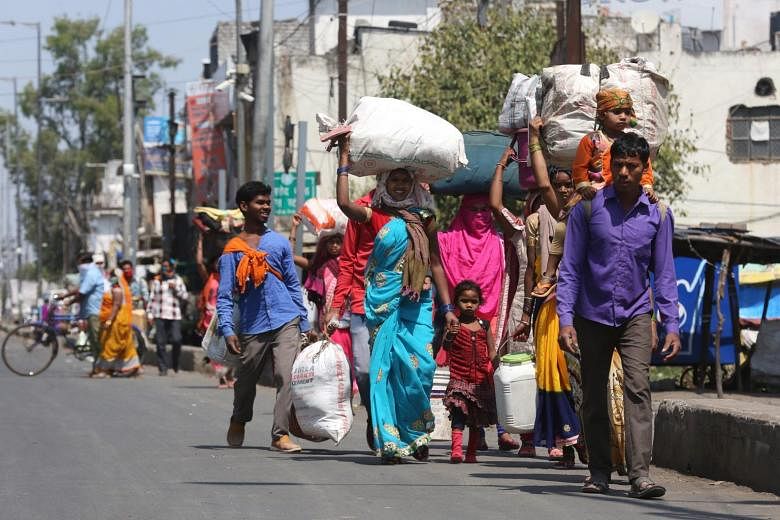NEW DELHI (THE STATESMAN/ASIA NEWS NETWORK) - What began as a trickle became a flow.
The exodus of migrant workers from Delhi saw thousands and thousands of them rushing to leave the city, fearing for their lives, worried, insecure and uncertain about their future.
While many would have been daily wage earners, some had regular jobs. This also happens to be the harvest season when migrants would seek to return home to join family members in harvesting their small holdings.
However a mass exodus, despite a collection of promises, including from the Prime Minister, on protection of salaries, availability of rations and release of funds direct into their accounts, could not have occurred naturally but would have been fuelled by rumours followed by pressure from some quarters.
Exodus from one city was the start of similar activities from other major cities too.
In either case the exodus was damaging. Whether it would lead to a nationwide spread of the pandemic or launch Stage 3 remains to be seen.
What it would do is damage the economy of Delhi for a long time. These were silent workers behind the boom of Delhi's construction, manufacturing, catering, personal services and shopping markets.
Once back in villages there would be no immediate desire to return, even if restrictions are lifted and normalcy appears.
Movement back would be slow as uncertainty would remain in their hearts. Their speed of return would be a trickle as compared to the rush to leave.
The services and industries in cities from where workers have left will remain silent for some time, even after restoration of the situation, as those working behind the scenes for its prosperity will be missing.
Urban economies, including meeting daily needs of its people, would be hampered for a long time.
The announcement of the lockdown may have created rumours indicating uncertainty and possible joblessness for a prolonged duration, but it was fuelled by broadcasters, who devoted hours of prime time interviewing those migrating, and shrieking to the government to provide them support including food, shelter and transport.
This resulted in even fence-sitters joining in and changing a small movement into an exodus.
A responsible media should have, on the other hand, informed their audience how rushed actions would be detrimental to the nation and public health and to themselves and how the state would cater for their needs.
They should also have been advised to remain at home till the lifting of the lockdown as transport would then be available.
The media should have assisted a confused migrant by giving the right advice. Even if few channels had taken this action, migration would have been stemmed.
Interestingly, most members of the media who were involved in this discourse were well-established media personalities and by acting irresponsibly, they have caused damage to society and the nation, rather than assisted the migrating masses.
They have aided the spread of the virus instead of backing government efforts to stem it. The media would seek to justify its actions by stating it was doing its duty and warning the state.
But it has in fact damaged the health of the nation, its economy and its structure. Irresponsible reporting would lead to more uncertainty not just in cities but even in villages, which were till recently unaffected by the virus.
The economy in villages would also be adversely impacted as their income was fuelled by inflow from these migrants. On the virus front, a vast movement from cities could result in its spread into regions which were till date unaffected.
The crowds were in such large numbers that it was beyond the capability of the administration to conduct basic medical checks and enforce social distancing.
States from where the migration commenced should have acted fast and addressed concerns of migrating workers by having political leaders come on TV channels as also interact with migrating workers.
Their silence conveys laxity and carelessness.
It is possible that within a few days most migrants would have reached their destinations, despite the Centre passing directions on closing inter-state, city and inter-district boundaries as also housing, feeding and financially supporting the workers.
They would continue moving despite all restrictions as fear would dominate their thoughts.
In villages, the power and authority wielded by sarpanches and elders is high. They would have inputs of those who have returned from cities. This will enable district authorities to conduct medical checks, village by village, with the cooperation of the village elders.
Hence, if correctly acted upon, any damage caused by the mass migration may be mitigated. An economic setback awaits the nation especially with non-availability of work force even when the pandemic is controlled, and the situation begins to normalise.
Markets and industrial units may open, but without labour, they are unlikely to regain effectiveness. It would take time for those who have migrated to return and assume their normal lives.
Medically, if states act in a timely manner, the threat of spread of the virus by this migration can be controlled. Imagination, working in unison at all levels and shifting focus from cities to villages could reverse the situation.
The days ahead will be tough for state administrations.
The writer is a retired Major-General of the Indian Army. The Statesman is a member of The Straits Times media partner Asia News Network, an alliance of 23 news media entities.

